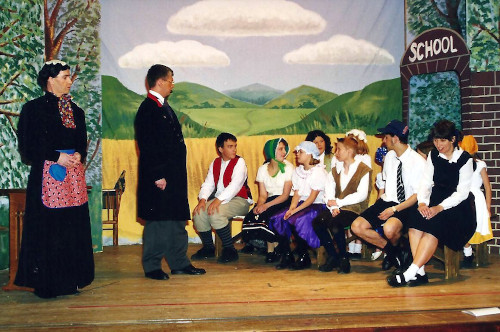Synopsis

‘Goody Two-Shoes’ is a rollicking good pantomime, full of humour, romance, audience participation, evil machinations and, of course, a happy ending. The wicked Squire Stinge has evicted Farmer Giles and his family from their farm in order to force the beautiful Goody to marry him.
The local school mistress, Dame Trotter, helps them out by letting them stay at the schoolhouse, provided that Goody gives her a hand with the naughty school children. Goody meets a fairy, who gives her magic shoes, and she meets and falls in love with a handsome stranger, Randolph, so everything seems to be going well after all.
However, Squire Stinge steals her shoes and plots to get rid of Randolph. In despair, Goody agrees to marry the Squire so that her parents can get their farm back.
When her brother, Bobby, returns from sea he discovers the plot and determines to find Randolph and bring him back – but he has only three days in which to save the day!
The last scene is full of excitement and romance, as Randolph returns in the nick of time to save Goody from a fate worse than death! Dame Trotter finds romance with the school inspector, and the fairy’s magic takes an unexpected turn. |
Characters
|
(8m, 5f, 6m/f, 8 juniors)
|
- Farmer Giles (m)
- Polly Giles - his wife (f)
- Goody - their daughter, the heroine (f)
- Bobby - their son (m)
- Sir Sidney Stinge - a mean Squire, the wicked villain (m)
- Grovel - his old servant, rather old and stupid (m)
- Randolph - handsome stranger (m)
- Lottie - young village girl, in love with Bobby (f)
- Dame Dorothy Trotter - the village schoolmistress, the dame (m)
- Adam Upright - the School Inspector (m)
- Fairy Starlight - overweight fairy, past her prime (f)
- Horace the Horse - two people (m/f)
- Bertie - overgrown schoolchild, played by an adult (m)
- Gertie - overgrown schoolchild, played by and adult (f)
- Villagers 1, 2, 3 and 4 - (m/f)
Children at Dame Trotter’s School - juniors
- Patience
- Jane
- Beth
- Alice
- Susie
- Peter
- Sam
- Jim
Chorus of villagers and schoolchildren
Can be performed with less villagers and less juniors if necessary |
|
 Loading... Please wait...
Loading... Please wait... Loading... Please wait...
Loading... Please wait...